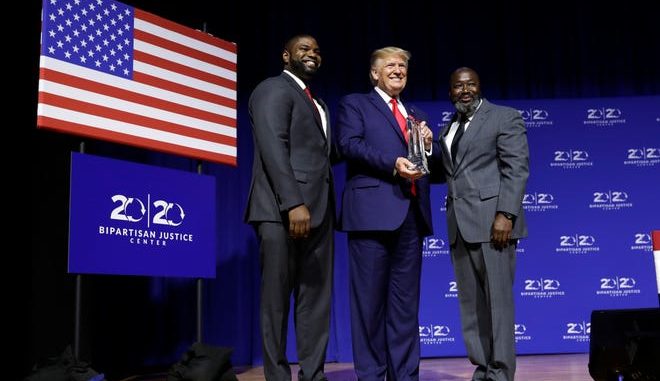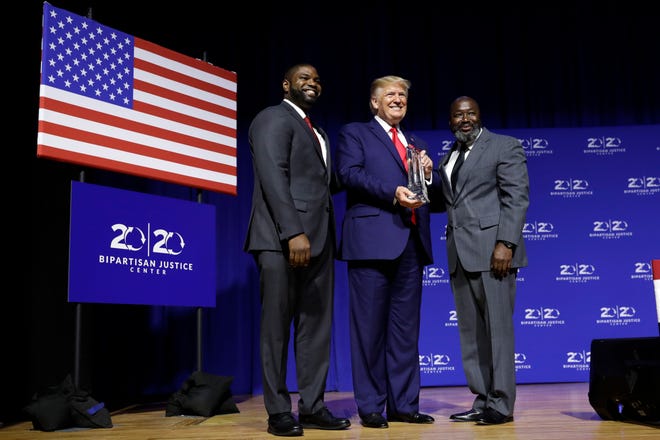

WASHINGTON – President Donald Trump is pitching his record to African-American voters on Friday in Atlanta, Georgia, where he will join Vice President Mike Pence to kick off the launch of the “Black Voices for Trump” coalition one year out from the 2020 election.
The president will deliver remarks at the World Congress Center in downtown Atlanta in an effort to broaden support among a group he’s proven to be deeply unpopular. Only 8% of African Americans cast their ballot for Trump in 2016 while his approval rating among black voters sits at just 10%, according to a recent survey by Quinnipiac University.
“I think that I’m going to get a tremendous percentage of votes from the African Americans,” Trump told reporters Sunday on the South Lawn of the White House.
Trump boasted that he had “the best unemployment numbers in the history of our country for African Americans.”
He also touted his administration’s efforts on criminal justice.
“Without me, you don’t have criminal justice reform. And that was for African Americans more than anybody else. So I think my standing in the African American community is maybe the best,” he added.
That’s the argument the campaign will make to the African-American community with the aim of peeling off black support in a few key states, like Wisconsin and Pennsylvania, where Trump won by razor-thin margins in 2016.
“Black Voices for Trump” will be a “national effort to mobilize and empower black Americans” to help spread the president’s message of “Promises Made, Promises Kept,” according to a statement by Katrina Pierson, a senior campaign adviser who is helping organize the coalition.
While convincing black voters he’s delivered on his promises at the end of his first term, it’ll be a stretch for Trump to deliver one he made in August 2016, when he told a crowd he would get 95% of the African American vote at the end of his first four years.
The president has made several overtures to the black community in recent months. Last month he spoke at the historically black Benedict College in Columbia, South Carolina, in what was billed as a keynote speech at a three-day presidential forum on criminal justice reform that featured some of his Democratic challengers.
But instead, Trump’s speech came a day before the other candidates appeared and was delivered to a handpicked crowd of supporters and just seven students. He was honored for the bipartisan passage of the First Step Act, which gives elderly inmates opportunities for release, increases the amount of good-time credit inmates can receive and assists with their transition back into society. His award prompted Democratic presidential candidate Kamala Harris to pull out of the event Saturday.
Trump also hosted the Young Black Leadership Summit, an event organized by the conservative group Turning Point USA, at the White House Oct. 4 In September, he spoke to a group of leaders from historically black colleges and universities (HBCUs) at an annual conference in Washington, where he announced faith-based HBCUs would no longer be restricted from federal funding for capital projects.
Trump has often touted the record-low unemployment rate among African Americans. When he took office in January 2017, the black jobless rate was 7.7% and has since fallen to 5.4% – the lowest on record dating to 1972.
But the president has drawn criticism over what some see as racially divisive language, most recently in clashes with the late House Oversight Chairman Elijah Cummings. Trump referred to his black-majority district in Baltimore as a “disgusting” and “rodent-infested mess.” He also criticized four freshman congresswomen of color known as “The Squad.” He initially attacked Reps. Alexandra Ocasio-Cortez (D-NY), Rashida Tlaib (D-MI), Ayanna Pressley (D-MA), and Ilhan Omar (D-MN), before zeroing in on Omar, who was born in Somalia but is a U.S. citizen. The spat intensified after supporters chanted “send her back” at one of his campaign rallies in North Carolina in July.
Trump often boasts that he outperformed former Republican presidential nominee Mitt Romney, who received just 6% among African American voters in 2012. But Theodore Johnson, a senior fellow at the Brennan Center for Justice who focuses on race and politics, points out he was running against the first black president, Barack Obama, who received 93% of the black vote.
“He actually fared worse than every other Republican presidential candidate that didn’t run against a black man since [Barry] Goldwater in 1964,” Johnson said. Goldwater took 4% of the African American vote.
George W. Bush received the highest number of African American voters with 11% in 2004, a jump from 8% in 2000.
Johnson isn’t convinced that the coalition or any of the president’s efforts among the African American community are aimed at expanding his appeal, but keeping the slice of black voters he does have in place.
“When he talks about unemployment numbers, when he talks about criminal justice reform and visits HBCUs, this is just to hold on to that 8% of those folks that he does have, in particular black men,” Johnson said.
“He gives just enough to show that they care, to some extent, about the black American experience by pointing to these policy wins, but the bigger thing is to cast doubt on whoever the Democrats put forth,” he said.
Johnson noted that black voter turnout dropped by seven points from 2012 to 2016, and dampening enthusiasm for Democrats could again lead to lower turnout, which is good for Trump. Every Democratic presidential candidate has received no less than 82% of the African-American vote since 1972.
Contributing: Eric Connor Carol Motsinger, The Greenville News

Be the first to comment